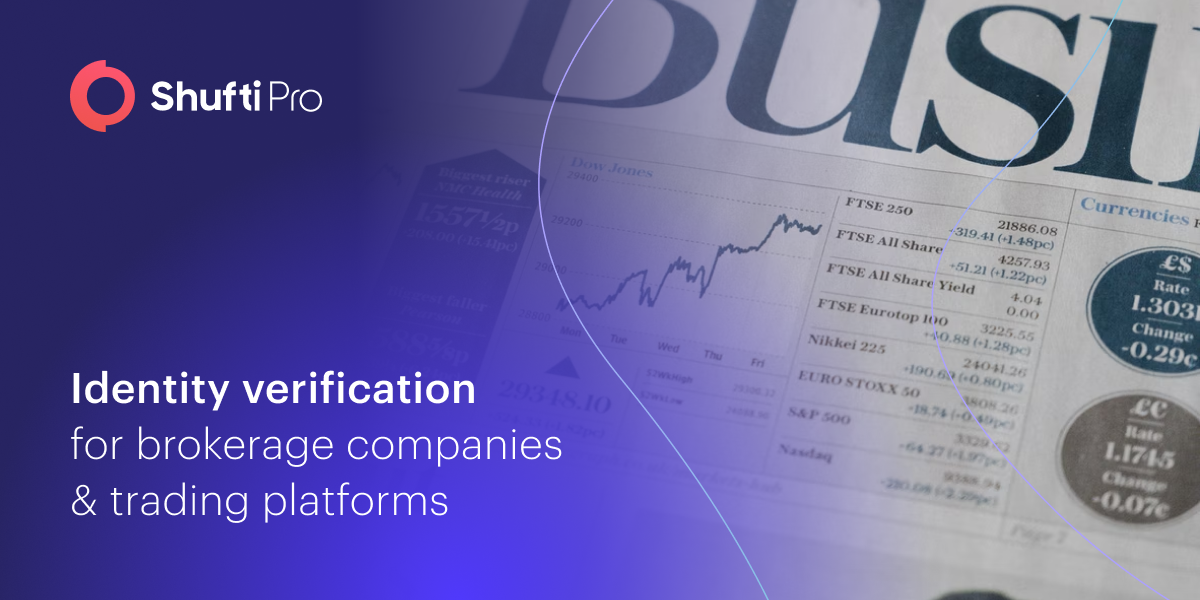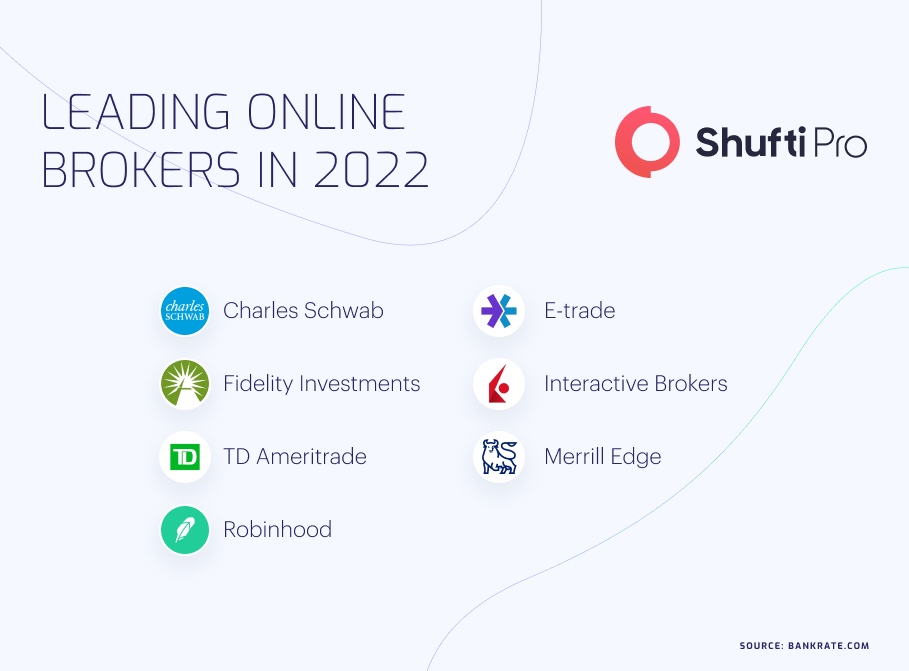KYC Compliance – Identity Verification for Brokerage Companies & Trading Platforms

Online trading platforms provide businesses with the convenience to keep an eye on financial markets to make better decisions regarding trade, forex, shares, and even digital assets. Every business needs to stay in touch with more than one broker to understand the market trends and trade their assets accordingly.
Brokerage and foreign exchange platforms are primarily over-the-counter services and operate through electronic devices, making them prone to identity fraud risks. Being a global industry, broking and trading aren’t regulated by a single definitive regulation. In different jurisdictions across the world, there are different regulations that oversee brokerage companies and online trading platforms.
Regulations for the Online Trading Sector
In the European Union, financial markets are regulated by the European Security and Market Authority (ESMA). The single regulation protects the online trading platforms in Europe from fraud risks and also collaborates with the European Banking Association (EBA) for improved industry reforms. In joint efforts, the two authorities impose restrictions, perform risk assessments, and oversee trading and brokerage operations.
In January 2018, the EU introduced the Markets in Financial Instruments Directive II (MiFID II). The MiFID II oversees all the operations related to trading in the EU, including those conducted in banks, stock exchanges, brokerages, trade, and hedge funds. The MiFID II is mainly targeted at making the EU trade market more transparent, secure, and harmonized with a definitive regulation for the entire sector. MiFID II regulates the operations of trading venues, processes, systems and the governance of trading entities.
The United Kingdom
Forex and brokerage firms in the UK are regulated by the Financial Conduct Authority (FCA), which ensures the prevention of fraud and financial crimes like money laundering and terrorist financing. The FCA enforces stringent oversight into regulated entities and requires them to report suspicious transactions while following the regulations. After the Money Laundering and Terrorist Financing Amendment of 2019, regulated firms in the UK are obliged to comply with the EU’s AMLDs in order to combat financial crimes.
Germany
In Germany, an independent regulatory authority known as BaFin regulates brokers, investments, stock exchanges, as well as insurance companies and any other businesses dealing with monetary transactions or processes. BaFin is known to be one of the most stringent regulatory bodies in the entire financial market due its to strict requirements for businesses. Forex companies and brokers in the country are required to abide by the regulations enforced by BaFin, which also falls under MiFID II.
France
The central bank of France, or Banque de France, is the primary supervisor that oversees the country’s financial markets. It is directly linked with the European Central Bank and also has other subsidiaries and supervisory agencies for the purpose of overseeing online trading platforms. The subsidiaries of the central bank regulate a wide array of financial institutions including insurance firms, investment companies, and forex trading platforms.
In addition to the central bank, the MiFID II and the EU AMLDs also oversee the compliance of brokerage and trading platforms. Not only that, online trading platforms are also under the scope of regulations enforced by the Autorité des Marchés Financiers – the primary regulator of financial markets.

The USA
When it comes to KYC/AML compliance, the US is always considered a tough spot. Brokerages and online trade platforms in the US are accustomed to processing large amounts of cash, resulting in higher risks of identity fraud for the purpose of money laundering. That being said, the US government is always making efforts to keep fraudsters at bay. For instance, brokers-dealers, foreign exchanges, and initial public offerings (IPOs) are regulated by the Securities and Exchange Commission (SEC). The federal government regulator deals with criminal cases and sets strict regulations that the financial market players must adhere to.
The USA’s online trading platforms and brokerage companies have to comply with various regulations, ranging from Sarbanes-Oxley, that is enforced to ensure the improvement of financial disclosures and corporate responsibility, all the way to the Dodd-Frank act that is aimed at boosting the protection of customers and ensuring transparency. Moreover, the SEC’s rules and regulations go hand in hand with those of FINRA (Financial Industry Regulatory Authority). FINRA can investigate and monitor businesses and individuals in the case of violation of financial crimes and securities.
The Need for KYC Verification
Brokerage companies throughout the world face the concerns of identity fraud and financial crime just like banks and insurance companies. In order to prevent their customers from becoming victims of identity fraud, brokerage firms are encouraged to comply with KYC/AML regulations. Considering the volumes of transactions at online trading platforms, these regulations have important implications for client onboarding.
Brokerage firms must incorporate identity verification among other KYC measures to ensure compliance with international standards. One of the essential requirements is to collect the customers’ personal information and implement robust measures to verify their identity during onboarding. Stock exchanges are also urged to implement measures to know their customers when they are engaging in monetary operations.
In case of onboarding legal entities, businesses need to implement Know Your Business measures to collect additional information. The brokerage firm has to take up the role of safeguarding the accounts, money, and documents related to the business or entity. Every entity must be verified through these checks and approved by the brokerage or online trading platform before any money is sent or received.
In addition to threats from businesses and their customers, some risks may arise from the links of the customers with political entities. For this reason, brokerage firms are also required to perform Enhanced Due Diligence in the case of high-risk customers. EDD involves the screening of the customer against global sanctions lists and PEP lists to eliminate money laundering, bribery, and corruption. Adopting a risk-based approach allows stock exchanges and trading platforms to mitigate the risks of fraud and financial crimes and steer clear of non-compliance penalties.
What Shufti Offers
Know Your Customer (KYC) requirements encourage brokerage companies to verify the identities of their customers as well as perfrom background screening to determine the intentional or unintentional involvement in criminal activities like money laundering and terrorist financing in the past.
Shufti offers AI-powered KYC/AML services for the forex industry, allowing forex companies to comply with AML guidelines and prevent financial crimes like money laundering. It verifies identities in less than a second and identifies high-risk entities through background screening against 1700+ watchlists.
Learn more about global KYC/AML compliance regulations for the forex industry

 Explore Now
Explore Now













